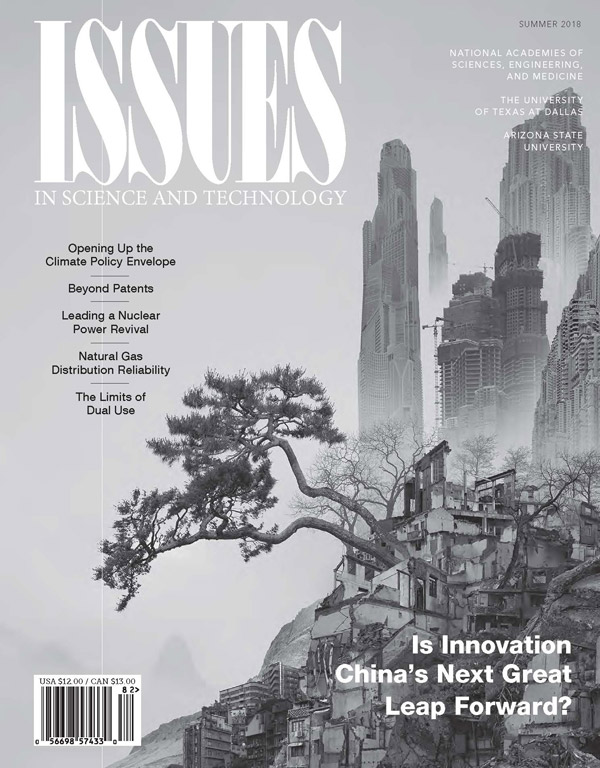
Issues in Science and Technology is the award-winning journal of the National Academies of Sciences, Engineering and Medicine, The University of Texas at Dallas and Arizona State University.
In the summer edition of Issues in Science and Technology, former CIA Director John Deutch challenges the assumption that the United States will maintain its global leadership in technological innovation.
“A number of significant indicators,” he writes, “suggest that China’s innovative capability is increasing more rapidly than that of the United States, portending a weakening of the United States’ relative global competitive position.” In his article, he lays out concrete policy steps that the United States can implement to improve its innovation performance.
In his article, Dr. Roger Pielke Jr. finds that the scenarios and models underlying policy recommendations from the Intergovernmental Panel on Climate Change rely on highly dubious assumptions. These include “negative emissions” technologies that don’t yet exist and predictions of “spontaneous decarbonization” that may be overly optimistic. Rather than relying on these assumptions about an uncertain future to make policy proposals work on paper, Pielke says it may make more sense to adapt to a range of possible climate futures. In a separate article, Dr. Bruce R. Guile and Dr. Rajul E. Pandya outline four ways to better adapt to a warming climate.
Dr. Michael J. Ford, Dr. Ahmed Abdulla, and Dr. M. Granger Morgan propose ways to help the United States regain ground in commercial reactor development and deployment. Also in the energy sector, most people are unaware that the natural gas pipeline system fails hundreds of times each year. That’s because there’s no national system to record these events and help improve reliability, according to Gerad Freeman, Dr. Jay Apt, and Michael Dworkin.
Also in this edition, Dr. Jeffrey Funk argues that patents may not be a useful predictor of innovativeness and that a focus on patenting may distract companies and researchers from developing more accurate measures of innovation. Dr. Tara Mahfoud, Dr. Christine Aicardi, Saheli Datta and Nikolas Rose go beyond the “dual-use” dichotomy to offer a more nuanced framework for guiding research that could have both military and civilian applications. Dr. Jack Barkenbus advocates a more measured approach to the commercialization of driverless cars. And in the Philosopher’s Corner, Dr. J. Britt Holbrook wonders what constitutes “science in the national interest.”
In the book review section, Dr. Carl Mitcham explores differences in Eastern and Western conceptions of technology — and humans’ place in the cosmos — in his review of Yuk Hui’s The Question Concerning Technology in China: An Essay in Cosmotechnics. In his review of Modernizing America’s Electricity Infrastructure by Mason Willrich, Dr. Kai N. Lee looks at the fragility of the U.S. electricity grid and the challenges of updating and improving it.
This edition also features the photo collages of Shanghai-based artist Yang Yongliang and the installation piece “Kintsugi++ by Certain Measures,” which challenges viewers to think about the reuse of waste.
Issues in Science and Technology is the award-winning journal of the National Academies of Sciences, Engineering and Medicine, The University of Texas at Dallas and Arizona State University.